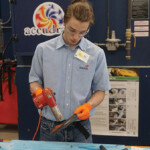Young Technicians Shine, Show Promise of Bright Future Through SkillsUSA Competition
by Alana Quartuccio Bonillo
The future of the collision repair industry shined bright on April 9 as students from different parts of the state returned to the Somerset County Vocational and Technical High School in Bridgewater for the first time since 2019 to compete in the SkillsUSA collision repair competition.
 Congratulations to Mase Fitzgerald-Angello (Passaic County Technical Institute) who won first place and will move on to the national competition. Kudos are also in store for second place winner Luke Donnadio (Somerset County Vocational and Technical High School) and third place winner John Lyzenga (Morris County Vocational School of Technology).
Congratulations to Mase Fitzgerald-Angello (Passaic County Technical Institute) who won first place and will move on to the national competition. Kudos are also in store for second place winner Luke Donnadio (Somerset County Vocational and Technical High School) and third place winner John Lyzenga (Morris County Vocational School of Technology).
Event Coordinator Charity Ritter (Bridgewater Collision) expressed her gratitude to everyone who took part and donated their time and support to the event.
“Our donors, Bridgewater Collision, really stepped up for us this year and donated large tool kits for our first, second and third place winners along with gift certificates for Snap-on tools for each winner. They also put together bags with hand tools and other goodies for every contestant to take home!”
In addition, National Coatings and Supplies donated hand tools which were raffled off to the contestants during the lunch break.
“I also really appreciate the time my judges donate that really help make the whole thing possible,” added Ritter.
Those involved with the competition were glad to see youngsters excited about the collision repair field, especially with the industry experiencing a widespread technician shortage.
Somerset Vo-tech Instructor George Byrd was not only glad for the return of the competition at his school but was grateful to see the enthusiasm shared by the students who competed.
“The SkillsUSA competition makes the students realize that the more they work at it, the better they will be at it,” explained the 74-year old instructor who has not only been sharing his wisdom and passion for collision repair working at the school for 30 years but is also a product of it; he graduated from the school in the 1960s.
Byrd shared some of the things he’s seen change over the years.
“The technology has advanced quite a bit, and it’s made it easier. In the ‘60s, when I was a student, the materials either worked or didn’t work, but the materials of today are so much better. They keep improving the equipment too,” he observed.
“It’s been tough to get kids involved in this profession, and we have a dwindling side of vo-tech collision programs as well,” shared Michael Bonsanto (Passaic County Technical Institute and I-CAR). “I want to say there are about eight or nine schools in our state still offering collision which is really sad.
“It would be great if we can get more kids competing from the vo-tech side,” he continued. “Whether they win or not, it doesn’t matter. That’s what I tell my students; the fact that they are stepping up and competing is great stuff, and it shows that they care.”
Byrd believes this year’s competition proved that interest in collision repair at the vo-tech level is coming back. He hopes to get more schools involved and see even more competitors next year.
Students can read articles and watch videos, but there is no real training unless you can do it hands-on, according to Byrd. He always tells his students to stick with it because collision repair can be a good way to make a living.
Want more? Check out the May 2022 issue of New Jersey Automotive!
